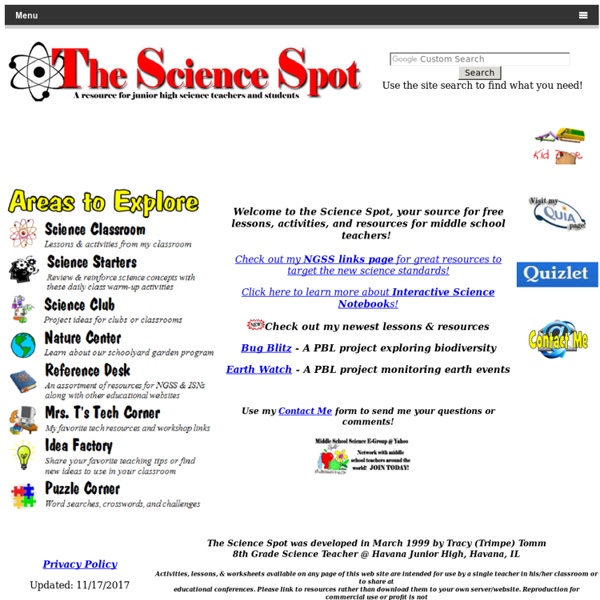



Teacher Resource Guides on Science Topics Ultimate Science Series - Over 2,500 Printables - For All Grade Levels View Now... Need Tons of New Worksheets? - 50,000+ printables - Save Time Now! View Now... Math Trainer - Times Tables Get in some serious math training. Responds to your answers, so it trains your weaknesses. Train yourself to remember, don't count (the cutoff time helps with this) New Version! Learn How To Be a Raspberry Pi Expert Today! Recently, the TechEducator Podcast recorded a show featuring a tiny microcomputer known as a Raspberry Pi. We learned that a Pi (“pie”) is a small computer board that is designed for students to create the computer of their dreams. Fitted with circuits and external ports, when put in the proper hands, a Raspberry Pi can do just about anything. But what if you don’t know the first thing about micro computing? Fortunately, a new twitter account has emerged from Trisha Sanches (@techistrish), Peter Stran (@strawn_ed), Brian Briggs (@bribriggs), and Techlandia’s own master podcaster Jon Samuelson (@jonsamuelson) called @picademyfanclub. Follow this new and sizzling hot account today to stay updated with the Pi Community.
50 Really Cool Online Tools for Science Teachers A 21st-century education revolves around the Internet for everything from collaboration, tools, lessons, and even earning degrees online. If you are looking for ways to integrate online learning into your science class or science degree programs, then take a look at these cool online tools that are just perfect for both teachers and students. Science Tools to Use with Students DISCOVERY: A Simulation of Early American Colonization - Interact Simulations Divided into separate "colonies," teams of students face problems typical of life in 17th-century America and try to ensure the success of their settlements. After deciding on cargo and using map skills to cross the sea and select their sites, students—playing such roles as colony leaders, bankers, mappers, traders, and recorders—are pressed to make decisions concerning the division of labor, the role of government, and defense against possible Indian attack. Interaction among the colonies results in trading, alliances, and sometimes conflict, while Fate Cards affect each colony's success or failure.
Learn how @BlackRocketLLC can teach your students how to create VIDEO GAMES! Podcast: Play in new window | Download (Duration: 28:17 — 12.9MB) | Embed Subscribe: iTunes | Android | Jeff sits down with Patricia Hillyer and Richard Ginn of BlackRocket to discuss how BlackRocket is helping students create amazing video games and learn the art of coding! About Black Rocket
Ten Websites for Science Teachers We all know that the web is full of excellent web resources for science teachers and students. However, unless you live on the web, finding the best websites can become quite a challenge. This isn't a "Top Ten" list -- instead, it is a list of websites that I either use on a regular basis or just find interesting. The World Factbook People from nearly every country share information with CIA, and new individuals contact us daily. If you have information you think might interest CIA due to our foreign intelligence collection mission, there are many ways to reach us. If you know of an imminent threat to a location inside the U.S., immediately contact your local law enforcement or FBI Field Office. For threats outside the U.S., contact CIA or go to a U.S.
Podcasts in the Elementary Classroom: Tools for Teachers and Students — Polar Oceans Stephanie is a science teaching fellow at the University of Colorado at Boulder. She is one of the creators of the Beyond Penguins and Polar Bears podcast series. Read her blog at Podcasts, audio recordings published on the Internet and played on computers and portable devices, are becoming popular among all types of audiences, including K-12 teachers and students.